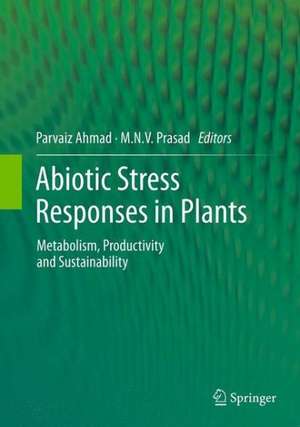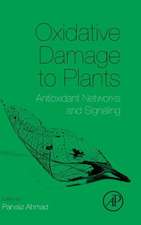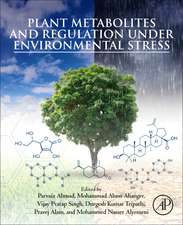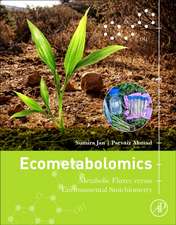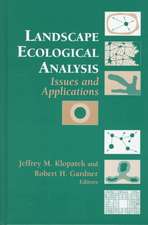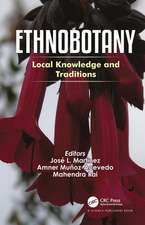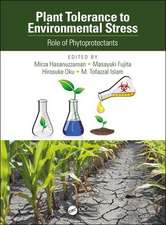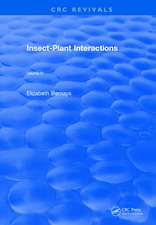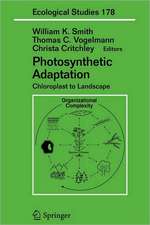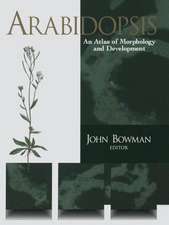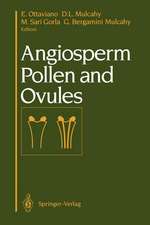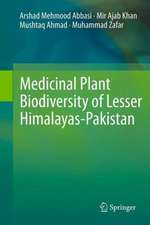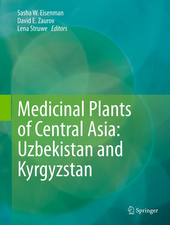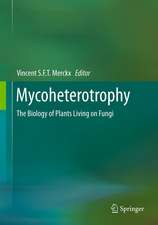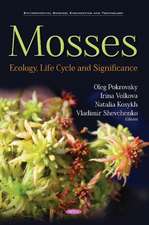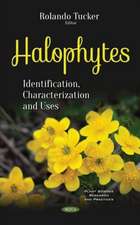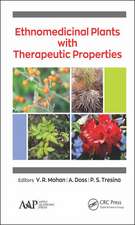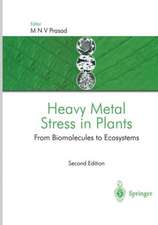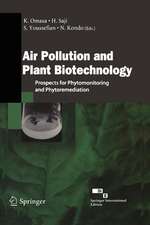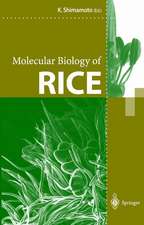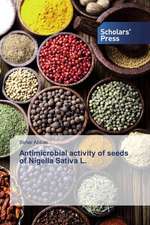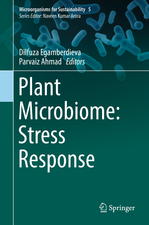Abiotic Stress Responses in Plants: Metabolism, Productivity and Sustainability
Editat de Parvaiz Ahmad, M. N. V. Prasaden Limba Engleză Hardback – 15 noi 2011
Dr. Parvaiz is Assistant Professor in Botany at A.S. College, Srinagar, Jammu and Kashmir, India. He has completed his post-graduation in Botany in 2000 from Jamia Hamdard New Delhi India. After his Ph.D from the Indian Institute of Technology (IIT) Delhi, India in 2007 he joined the International Centre for Genetic Engineering and Biotechnology, New Delhi. He has published more than 20 research papers in peer reviewed journals and 4 book chapters. He has also edited a volume which is in press with Studium Press Pvt. India Ltd., New Delhi, India. Dr. Parvaiz is actively engaged in studying the molecular and physio-biochemical responses of different plants (mulberry, pea, Indian mustard) under environmental stress.
Prof. M.N.V. Prasad is a Professor in the Department of Plant Sciences at the University of Hyderabad, India. He received B.Sc. (1973) and M.Sc. (1975) degrees from Andhra University, India, and the Ph.D. degree (1979) in botany from the University of Lucknow, India. Prasad has published 216 articles in peer reviewed journals and 82 book chapters and conference proceedings in the broad area of environmental botany and heavy metal stress in plants. He is the author, co-author, editor, or co-editor for eight books. He is the recipient of Pitamber Pant National Environment Fellowship of 2007 awarded by the Ministry of Environment and Forests, Government of India.
| Toate formatele și edițiile | Preț | Express |
|---|---|---|
| Paperback (1) | 1280.39 lei 6-8 săpt. | |
| Springer – 23 aug 2016 | 1280.39 lei 6-8 săpt. | |
| Hardback (1) | 1239.37 lei 6-8 săpt. | |
| Springer – 15 noi 2011 | 1239.37 lei 6-8 săpt. |
Preț: 1239.37 lei
Preț vechi: 1511.42 lei
-18% Nou
Puncte Express: 1859
Preț estimativ în valută:
237.16€ • 248.23$ • 197.39£
237.16€ • 248.23$ • 197.39£
Carte tipărită la comandă
Livrare economică 31 martie-14 aprilie
Preluare comenzi: 021 569.72.76
Specificații
ISBN-13: 9781461406334
ISBN-10: 1461406331
Pagini: 492
Ilustrații: XV, 473 p.
Dimensiuni: 178 x 254 x 30 mm
Greutate: 1.07 kg
Ediția:2012
Editura: Springer
Colecția Springer
Locul publicării:New York, NY, United States
ISBN-10: 1461406331
Pagini: 492
Ilustrații: XV, 473 p.
Dimensiuni: 178 x 254 x 30 mm
Greutate: 1.07 kg
Ediția:2012
Editura: Springer
Colecția Springer
Locul publicării:New York, NY, United States
Public țintă
Professional/practitionerCuprins
Abiotic Stress Responses in Plants - Present and Future.- Abiotic Stress Induced Morphological and Anatomical Changes in Plants.- Abiotic Stress Responses in Plants-Metabolism to Productivity.- Approaches to increasing salt tolerance in crop plants.- Understanding and Exploiting the Impact of Drought Stress on Plant Physiology.- Sustainable Fruit Production in Mediterranean Orchards Subjected to Drought Stress.- Drought Stress Induced Reactive Oxygen Species and Antioxidants in Plants.- Role of Glutathione Reductase in Plant Abiotic Stress.- Flavonoids as antioxidants in plants under abiotic stresses.- Proteomic Markers for Oxidative Stress-New Tools for Reactive Oxygen Species and Photosynthesis Research.- Environmental Stress and Role of Arbuscular Mycorrhizal Symbiosis.- Effects of Exogenous Application of 5-aminolevulinic acid (ALA) in Crop Plants.- Abiotic Stress and Role of Salicylic Acid in Plants.- Trehalose and Abiotic Stress Tolerance.- Uptake of mineral elements during abiotic stress.- Effect of Micronutrient Deficiencies on Plants Stress Responses.- Stress-induced flowering.- Postharvest stress treatments in fruits and vegetables.- Abscisic Acid Signaling in Plants.- Plant tolerance and fatty acid profile in responses to heavy metals.- Cd Accumulation and Subcellular Distribution in Plants and Their Relevance to the rophic Transfer of Cd.- The Role of Soil Organic Matter in Trace Element Bioavailability and Toxicity.- Oxidative Stress and Phytoremediation.- Phytoremediation of low levels of heavy metals using Duckweed (Lemna minor).
Notă biografică
Textul de pe ultima copertă
Abiotic stress cause changes in soil-plant-atmosphere continuum and is responsible for reduced yield in several major crops. Therefore, the subject of abiotic stress response in plants - metabolism, productivity and sustainability - is gaining considerable significance in the contemporary world. Abiotic stress is an integral part of “climate change,” a complex phenomenon with a wide range of unpredictable impacts on the environment. Prolonged exposure to these abiotic stresses results in altered metabolism and damage to biomolecules. Plants evolve defense mechanisms to tolerate these stresses by upregulation of osmolytes, osmoprotectants, and enzymatic and non-enzymatic antioxidants, etc. This volume deals with abiotic stress-induced morphological and anatomical changes, abberations in metabolism, strategies and approaches to increase salt tolerance, managing the drought stress, sustainable fruit production and postharvest stress treatments, role of glutathione reductase, flavonoids as antioxidants in plants, the role of salicylic acid and trehalose in plants, stress-induced flowering. The role of soil organic matter in mineral nutrition and fatty acid profile in response to heavy metal stress are also dealt with. Proteomic markers for oxidative stress as a new tools for reactive oxygen species and photosynthesis research, abscisic acid signaling in plants are covered with chosen examples. Stress responsive genes and gene products including expressed proteins that are implicated in conferring tolerance to the plant are presented. Thus, this volume would provides the reader with a wide spectrum of information including key references and with a large number of illustrations and tables.
Dr. Parvaiz is Assistant Professor in Botany at A.S. College, Srinagar, Jammu and Kashmir, India. He has completed his post-graduation in Botany in 2000 from Jamia Hamdard New Delhi India. After his Ph.D from the Indian Institute of Technology (IIT) Delhi, India in 2007 he joined the International Centre for Genetic Engineering and Biotechnology, New Delhi. He has published more than 20 research papers in peer reviewed journals and 4 book chapters. He has also edited a volume which is in press with Studium Press Pvt. India Ltd., New Delhi, India. Dr. Parvaiz is actively engaged in studying the molecular and physio-biochemical responses of different plants (mulberry, pea, Indian mustard) under environmental stress.
Prof. M.N.V. Prasad is a Professor in the Department of Plant Sciences at the University of Hyderabad, India. He received B.Sc. (1973) and M.Sc. (1975) degrees from Andhra University, India, and the Ph.D. degree (1979) in botany from the University of Lucknow, India. Prasad has published 216 articles in peer reviewed journals and 82 book chapters and conference proceedings in the broad area of environmental botany and heavy metal stress in plants. He is the author, co-author, editor, or co-editor for eight books. He is the recipient of Pitamber Pant National Environment Fellowship of 2007 awarded by the Ministry of Environment and Forests, Government of India.
Dr. Parvaiz is Assistant Professor in Botany at A.S. College, Srinagar, Jammu and Kashmir, India. He has completed his post-graduation in Botany in 2000 from Jamia Hamdard New Delhi India. After his Ph.D from the Indian Institute of Technology (IIT) Delhi, India in 2007 he joined the International Centre for Genetic Engineering and Biotechnology, New Delhi. He has published more than 20 research papers in peer reviewed journals and 4 book chapters. He has also edited a volume which is in press with Studium Press Pvt. India Ltd., New Delhi, India. Dr. Parvaiz is actively engaged in studying the molecular and physio-biochemical responses of different plants (mulberry, pea, Indian mustard) under environmental stress.
Prof. M.N.V. Prasad is a Professor in the Department of Plant Sciences at the University of Hyderabad, India. He received B.Sc. (1973) and M.Sc. (1975) degrees from Andhra University, India, and the Ph.D. degree (1979) in botany from the University of Lucknow, India. Prasad has published 216 articles in peer reviewed journals and 82 book chapters and conference proceedings in the broad area of environmental botany and heavy metal stress in plants. He is the author, co-author, editor, or co-editor for eight books. He is the recipient of Pitamber Pant National Environment Fellowship of 2007 awarded by the Ministry of Environment and Forests, Government of India.
Caracteristici
Features comprehensive coverage of abiotic stress responses in plants Can be read on its own, as well as a complement to Environmental Adaptations and Stress Tolerance of Plants in the Era of Climate Change Encompasses the collected insights and research of the foremost authorities in the plant sciences
